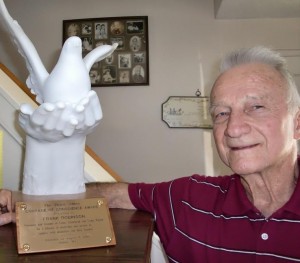By Julia Spitz/Daily News staff
When a young man followed his college crush from Kentucky to Maine in the summer of 1948, the romance fizzled, but a new love blossomed into something that would change thousands of lives.
He fell in love with the kids at the Pine Tree Camp for Crippled Children, said Frank “Rob” Robinson, who founded Camp Arrowhead in Natick in 1958, and, in 1970, Ashland’s Camp Warren, which became Camp Echo in Goshen and was later incorporated into the 4H Camp Howe.
The Framingham resident’s visionary approach to pairing student volunteers with disabled campers recently put him in the company of the Dalai Lama and Archbishop Desmond Tutu as a recipient of the Sherborn Peace Abbey’s Courage of Conscience Award.
Lewis Randa, the Peace Abbey’s executive director, “called me about a week before” the award was bestowed last month. “I thought he was kidding. It was overwhelming when he said, ‘We’re going to give it to you.’ ”
The honor is well deserved, say those who know the 83-year-old Robinson.
“His hands are bigger than anything I’ve ever seen” in his ability to reach out to others, said Mike Rourke, who, like Robinson, served as the Natick Recreation Department’s director. “And his heart is bigger than his hands.”
“He’s so worthy, even in the elite company of that award,” said Jim Argir, the Natick native Robinson asked to supervise the Neetega Club for teens more than 50 years ago.
His experience at the Easter Seals camp in Maine was a life-changing experience, said Robinson. The campers “taught me so much,” and the lessons led him to Springfield College for a graduate degree in recreation, and from there, to Natick, with his wife, Pat, whom he met at the Maine camp.
In Natick, “I thought everybody should be exposed to (lessons) the handicapped kids teach you,” and he asked Joe Sheridan, commander of the Amputee Veterans post, if he could use the Lake Cochituate camp when the vets weren’t there.
With Neetega members as volunteers, it became an immediate success, said Robinson. “The people who followed me helped it grow and expand.”
While Natick quickly became Robinson’s adopted hometown, Pat’s sudden death led to changes in 1964. He moved to Winthrop, where his mother-in-law helped care for his young daughters, Nancy and Lynne, and he took over the leadership of the Easter Seals Society in Boston.
When he left Natick, about 1,500 people turned out for the going-away party at the Monticello in Framingham, Argir said.
Singer Connie Francis performed at the party. “I thought I’d died and gone to heaven,” Robinson recalled.
In 1966, he joined the faculty at Northeastern University, where he taught recreation therapy, wrote three books, acquired the nickname “Coach,” and nurtured a new group of volunteers for campers at the Ashland facility owned by Northeastern.
Kids on stretchers would come, but no matter how disabled the camper, the college students found a way to foster a fun experience.
“I still hear from some of them today,” he said of volunteers and campers.
When Northeastern shifted its vision for the Ashland site in 1980, Robinson, campers’ parents and volunteers came up with a plan for a place in Goshen formerly used by the Cerebral Palsy Foundation. “We had kids in wheelchairs living in tents,” but somehow it all worked.
So did the introduction the Camp Echo nurse made in 1981, when she suggested he should meet a friend of hers who was a former nun working in hospice care.
“Everybody thought we would be a great couple because we were both crazy,” said Elinor Robinson. “I was working with the dying and he was working with the disabled.”
They married in 1982 and moved to Framingham, although “Rob” can often be found in the stands rooting for Natick during football season.
“He’s a magnet – a kid magnet, a people magnet,” Linda Frank said of her neighbor who, after retiring, became a Big Brother to two young men and sang bass with the New Sound Assembly Chorus.
“The single most important thing is his contribution to humanity,” said Rourke.
